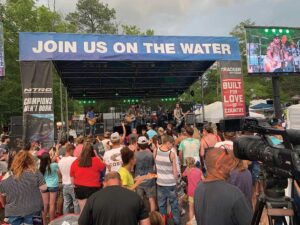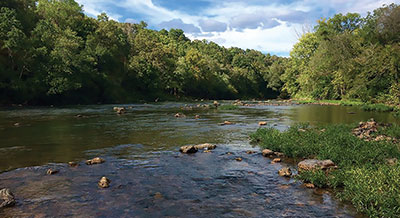
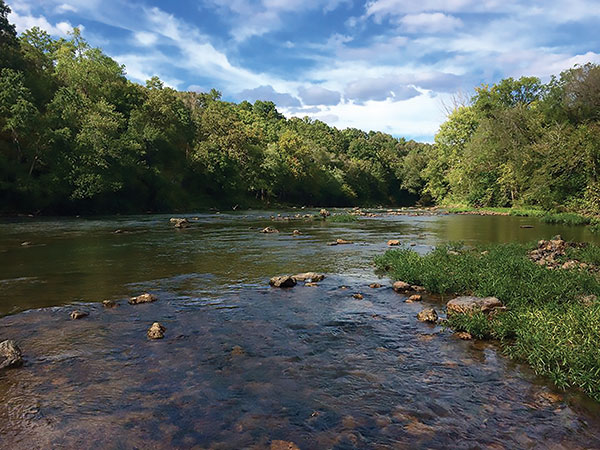
Coosa Riverkeeper and lake associations work to protect treasured waterways
Story by Paul South
Submitted photos
Even in the bleak midwinter, in a season of heavy rain and rising water, Gene Phifer, Linda Ruethemann and Frank Chitwood can almost set clocks by the nature’s magic on the Coosa River.
For Phifer, president of the Neely Henry Lake Association, the White American Pelican returns to entertain each winter, nesting near Phifer’s Neely Henry Lake home. For Ruethemann, a board member and past president of the Logan Martin Lake Protection Association, small black ducks – Ruethemann calls her feathered neighbors “diving ducks” – plunge for food under the Army khaki green water in the mornings, delighting a human audience.
And for Frank Chitwood, the Staff Riverkeeper and founder of the environmental watchdog group Coosa Riverkeeper, anytime is a good time on the river. But the special times are when the sun rises or sets, painting an ever-changing pallet, the moon is full and glowing, or in those seasons when colors, not crowds, clamor for attention.
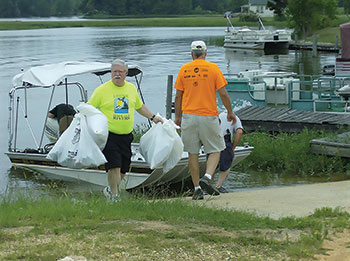
The lake associations and the Coosa Riverkeeper are united in a singular mission – to protect the Coosa River system that runs through Alabama, downstream from the river’s headwaters at the confluence of the Etowah and Oostanaula rivers near Rome, Ga. The heart of the mission – to protect the quality and quantity of the waters of Coosa and its six lakes and by extension, the overall environment and economy.
Phifer calls Neely Henry, the Coosa and its sister lakes, “a treasure.” The three organizations are carrying on a love affair with the water.
“It’s really a treasure to have something like this, Phifer said. “There’s no other way to put it. We’re so fortunate. We have a river system that flows through the center of Gadsden and then on downstream. With a river like this with all the recreational and all the aesthetic and environmental benefits of it, goodness, it’s a treasure to have this. You don’t see this when you go across the United States.
Native peoples called the Coosa home long before Hernando DeSoto became the first European to see the river in the 16th century. Neely Henry and Logan Martin were man-made bodies of water, the result of Alabama Power’s construction of hydroelectric dams in the 1960s. While these days, the river and lakes are in better health, there was a time in the not-so-distant past when Logan Martin, Neely Henry and its parent river were a dumping ground for all manner of human refuse from beer cans to busted refrigerators.
“The river system years ago was a biological eyesore as far as the way the water was being treated at that time. Something needed to be done,” Phifer said. “Things weren’t being done the way they should have been done by residents and the communities. Renew Our Rivers moved to the cities and counties, and a groundswell of law enforcement, schools, businesses and the media got involved, too. Etowah, St. Clair and Calhoun all got involved.”
The result was Renew Our Rivers. Started in 1998 on Neely Henry and quickly spreading to other Alabama waterways. On Neely Henry alone, some 500 tons to debris has been cleaned out of the river. On Logan Martin, the first year saw tons of debris pulled from the lake. The amount has decreased over the years, thanks to increased awareness throughout the water system.
Team work
Keeping the Coosa River system clean is only part of the story. For example, an all-volunteer army of trained Logan Martin residents take to the river monthly to test the waters. The effort springs from an Auburn University initiative called Alabama Water Watch.
Since 1996, the water tests have been carried on come rain or sun, sleet or snow. Ruethemann is a trainer for the testing effort, which looks for warning signs in the water. “You don’t have to be a chemist to be a tester,” she says. “If you can follow a recipe, you can do this.”
Testers don’t worry much about weekly reports but search for trends in quality.
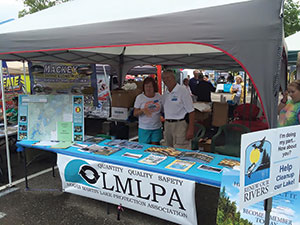
“When I’m out testing and someone sees me, they say, ‘Is the water good?’ And I can tell you what the numbers are today. But what you’re really looking for are the trends,” she says. “Is the water quality getting better? Is it getting worse? Do you suddenly see changes in certain areas of water quality that we need to take notice of and say, ‘Something’s changed here, what is that?’ Then you start going upstream to where the issue started.”
Like the associations, Coosa Riverkeeper is focused on water quantity and quality. Chitwood, founder of Coosa Riverkeeper and the retiring staff riverkeeper for the organization, patrols the waters in a quest to safeguard the river. He founded Coosa Riverkeeper in 2010 after volunteering for other Riverkeeper organizations around the country.
Like the Neely Henry and Logan Martin citizen groups, Coosa Riverkeeper is an advocate for the river system. While unlike the other organizations, Riverkeeper has a small paid staff, the goals of the groups are the same.
“What we do is patrol the river, educate the public and advocate on behalf of the river. Citizen-based, nonprofit,” Chitwood said. “We do a lot of the work that people expect the government does, but they don’t. In a sense, we are a watchdog organization. We do things like monitor water quality to make sure it’s safe to swim and to fish. We respond to citizen complaints. We go and speak to school groups or civic groups about the river and its importance. We monitor pollution sources and seek to reduce those sources of pollution.”
The public perception of the organization among river residents has changed since its early days.
“When we first started, not many people knew what the Coosa River was,” Chitwood said. “They thought of it as individual lakes. So, we talked to people on Logan Martin about the Coosa and they’d say, “We don’t know where that is, and we’d say, it’s right here.” That has changed a lot. They are more aware of the connectivity between systems and between the lakes and how we’re impacted by what people upstream of us are doing. That’s one big change.”
The other is changing the general perception that the Coosa is unsafe for swimming because it does have such a polluted history, especially on Logan Martin because of the PCB issue. What we did was start a program called Swim Guide, where we do water quality testing all over the river every week in the summer. We post that information free so people can see if it’s safe or not to swim that week in their location, instead of just speculation and hearsay. That has been really huge. A lot of people have been reassured about the safety of swimming in the river. But a lot more people are assured about the safety of the water.”
And Coosa Riverkeeper isn’t shy about using the legal system to protect the waterway.
While the lake associations closely monitor water issues and advocate and educate on behalf of the river system to schools, civic groups and government agencies, Coosa Riverkeeper will put its legal muscle behind its efforts.
“That’s why I’m really proud of our group because we’re standing up and doing something about it. And we’re making progress. It just takes people to stand up against industry and the government that are insanely powerful in Alabama and say that’s not really how we want things to happen in Alabama,” he noted.
“There are people out there that they know what they’re doing is not right. And they know that what they’re doing has an impact. But if they don’t get fined for it and they’re not going to spend however much money it is to do the right thing, there’s no consequence. It takes more than one approach to really address all these issues. That’s what sets our group apart. We’re willing to go toe-to-toe with industry, and we’re willing to call in the lawyers and file a lawsuit. There aren’t a lot of groups willing to do that. I think that we have to be willing to do that. If we don’t, we’re never going to change the status quo.”
Perhaps the dominant issue – one that would impact the three-legged stool of the lake associations’ mission to protect water quality, quantity and property values – are the so-called “Water Wars” among Alabama. Georgia and Florida.
In an effort to get more water for a thirsty, growing Metropolitan Atlanta area, Georgia wants to dam the waters that flow into the Coosa, which is downriver from the confluence of the Etowah and Oostanaula. Its impact reaches far beyond the Coosa, to the Tallapoosa and the Alabama Rivers. The Alabama is a navigable waterway, critical for barge traffic to the Port of Mobile.
Choking the flow of water to the Coosa, however, would damage a fragile ecosystem and parch the local economy. If you want an idea of how brittle the Coosa and its lakes are, consider indigenous beavers in the wake of February flooding. While it’s the opposite effect compared to lower water levels, the lesson here is environmental impact.
“Any change in the water level is going to affect the environment,” Ruethemann says. “While it’s the opposite of that, in the flood, beavers were wandering in people’s yards, and they were scared, not sure where to go.”
All of the Coosa advocacy groups are closely monitoring the mountain of litigation related to the water wars, Phifer said.
“We can’t continue to lose a lot of water without damaging us downstream in dry season. When nutrient levels in the water get too high, you have the potential for the nutrients to cause rapid algae growth and when the algae die, it sucks oxygen from the river system, damaging quality of life for the river. When you have dissolved oxygen, it becomes a pollution problem.”
In the years ahead, if the waters of the Cahaba – from which Birmingham derives much of its water – begins to run dry – there is concern that a parched Magic City might turn to the Coosa for water, putting the Coosa in the crossfire of two fronts in the water wars.
“That’s not just a battle for Alabama, Florida and Georgia, but there’s going to be a battle between Birmingham and the Coosa,” Chitwood says. “It’s only going to be so long before Birmingham comes for the Coosa. They’ve talked about it before.”
“When I train people in these (water testing) classes, I tell them, water in not a limitless quality,” Ruethemann says. “You can’t make new water. People say, ‘Why don’t you go to the Birmingham Water Works and get more water? Well, where do you think they get that water?”
One of her water testing students took a biblical view, she says. “Yup, that’s the same water that floated Noah’s boat.”
Ruethemann adds, “As it gets more limited and as we have more people, and we start growing more in urban areas like Atlanta and in the outskirts of Birmingham, people are going to be fighting for that limited amount of water.”
Other development-related issues, like sediment runoff from construction sites, sewerage and stormwater runoff concern the Coosa River organizations of Weiss, Neely Henry, Logan Martin, Lay, Jordan and Mitchell that make up what Ruethemann calls, “The Coalition.”
But another point of advocacy for Coosa Riverkeeper and the Neely Henry and Logan Martin groups is the development of a statewide comprehensive water management plan. Currently, Alabama is the only state in the Southeast without a water management blueprint.
“In my opinion, (if) we get to a courtroom, it’s hard for us to say (water) is of utmost importance when we don’t have a plan together. I think that plays against us tremendously.”
What happens to the Coosa if Alabama loses the water fight?
“We always think the worst. I think human nature is (to think) that everything will fall apart. I don’t know. There are many places on this lake that if the water stayed at 460 (feet), that a lot of people would not have waterfront property at all. You’d still see the diving ducks and the pelicans, but in these narrow sloughs, a lot of people would not have waterfront at all.”
Water quality and quantity should be on the minds of folks along the Coosa and across Alabama, as neighboring Georgia builds more reservoirs at the headwaters of the river.
“I would bet you if you talk to 90 percent of the people in this state, they don’t even think about water, Ruethemann says. “They turn on the faucet, and it’s there. They go to the beach or lake or river of their choice, and it’s there. We have a lot of water in Alabama – today.”
Should they think about it?
“Oh yeah,” she says. “At some point in time, it’s going to become an issue.”
Meanwhile the groups collaborate, educate and advocate for the river system, pushing for clean, ample water, effective policies and responsible development. The reason is simple. “Anyone who spends time on our waterways in Alabama is going to appreciate them,” Chitwood says. “You’re not going to go kayaking on Big Canoe Creek and say, ‘Who really cares about that creek? ‘You’re going to say ‘Wow, that’s something worth protecting.”













